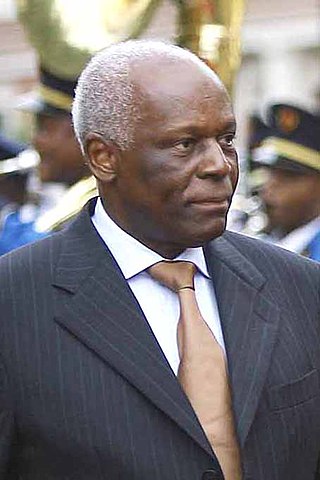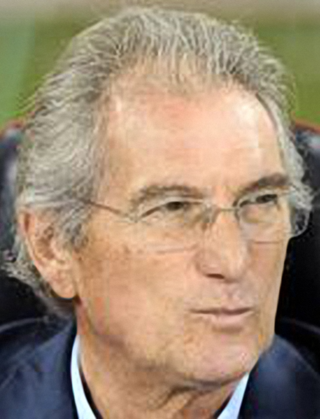| Personal information | |||
|---|---|---|---|
| Place of birth | Brazil | ||
| Managerial career | |||
| Years | Team | ||
| 1996 | Ghana | ||
| 2002–2003 | Angola | ||
Ismael Kurtz is a Brazilian football manager active primarily in Africa.
| Personal information | |||
|---|---|---|---|
| Place of birth | Brazil | ||
| Managerial career | |||
| Years | Team | ||
| 1996 | Ghana | ||
| 2002–2003 | Angola | ||
Ismael Kurtz is a Brazilian football manager active primarily in Africa.
Kurtz managed the Ghana national team at the 1996 African Cup of Nations, before being appointed manager of Angola in March 2002. [1]

Angola, officially the Republic of Angola, is a country located on the west-central coast of Southern Africa. It is the second-largest Lusophone (Portuguese-speaking) country in both total area and population, and is the seventh-largest country in Africa. It is bordered by Namibia to the south, the Democratic Republic of the Congo to the north, Zambia to the east, and the Atlantic Ocean to the west. Angola has an exclave province, the province of Cabinda, that borders the Republic of the Congo and the Democratic Republic of the Congo. The capital and most populous city is Luanda.

The economy of Angola remains heavily influenced by the effects of four decades of conflict in the last part of the 20th century, the war for independence from Portugal (1961–75) and the subsequent civil war (1975–2002). Despite extensive oil and gas resources, diamonds, hydroelectric potential, and rich agricultural land, Angola remains poor, and a third of the population relies on subsistence agriculture. Since 2002, when the 27-year civil war ended, government policy prioritized the repair and improvement of infrastructure and strengthening of political and social institutions. During the first decade of the 21st century, Angola's economy was one of the fastest-growing in the world, with reported annual average GDP growth of 11.1 percent from 2001 to 2010. High international oil prices and rising oil production contributed to strong economic growth, although with high inequality, at that time.

Heart of Darkness (1899) is a novella by Polish-English novelist Joseph Conrad in which the sailor Charles Marlow tells his listeners the story of his assignment as steamer captain for a Belgian company in the African interior. The novel is widely regarded as a critique of European colonial rule in Africa, whilst also examining the themes of power dynamics and morality. Although Conrad does not name the river on which most of the narrative takes place, at the time of writing the Congo Free State, the location of the large and economically important Congo River, was a private colony of Belgium's King Leopold II. Marlow is given a text by Kurtz, an ivory trader working on a trading station far up the river, who has "gone native" and is the object of Marlow's expedition.


Angola was first settled by San hunter-gatherer societies before the northern domains came under the rule of Bantu states such as Kongo and Ndongo. In the 15th century, Portuguese colonists began trading, and a settlement was established at Luanda during the 16th century. Portugal annexed territories in the region which were ruled as a colony from 1655, and Angola was incorporated as an overseas province of Portugal in 1951. After the Angolan War of Independence, which ended in 1974 with an army mutiny and leftist coup in Lisbon, Angola achieved independence in 1975 through the Alvor Agreement. After independence, Angola entered a long period of civil war that lasted until 2002.

The National Union for the Total Independence of Angola is the second-largest political party in Angola. Founded in 1966, UNITA fought alongside the Popular Movement for the Liberation of Angola (MPLA) in the Angolan War for Independence (1961–1975) and then against the MPLA in the ensuing civil war (1975–2002). The war was one of the most prominent Cold War proxy wars, with UNITA receiving military aid initially from the People's Republic of China from 1966 until October 1975 and later from the United States and apartheid South Africa while the MPLA received support from the Soviet Union and its allies, especially Cuba.

Jonas Malheiro Savimbi was an Angolan revolutionary, politician, and rebel military leader who founded and led the National Union for the Total Independence of Angola (UNITA). UNITA waged a guerrilla war against Portuguese colonial rule from 1966 to 1974, then confronted the People's Movement for the Liberation of Angola (MPLA) during the Angolan Civil War. Savimbi was killed in a clash with government troops in 2002.

José Eduardo dos Santos was the president of Angola from 1979 to 2017. As president, dos Santos was also the commander-in-chief of the Angolan Armed Forces (FAA) and president of the People's Movement for the Liberation of Angola (MPLA), the party that has ruled Angola since it won independence in 1975. He was the second-longest-serving president in Africa, surpassed only by Teodoro Obiang Nguema Mbasogo of Equatorial Guinea.

The Mali national football team represents Mali in men's international football and is governed by the Malian Football Federation. The team's nickname is Les Aigles. They represent both FIFA and the Confederation of African Football (CAF).

The Angola national football team represents Angola in men's international football and is controlled by the Angolan Football Federation. Nicknames Palancas Negras, the team is a member of both FIFA and the Confederation of African Football (CAF).

The Central African Republic national football team, nicknamed Les Fauves, is the national team of the Central African Republic and is controlled by the Central African Football Federation. They are a member of CAF. Despite being traditionally one of the weakest teams in Africa and the world, they recently achieved success. They won the 2009 CEMAC Cup by beating Gabon in the semi-finals and Equatorial Guinea in the final 3–0. Their FIFA ranking rose from 202nd in August 2010 to 89th by July 2011. On 10 October 2010, they earned a shock 2012 Africa Cup of Nations qualifier win at home against Algeria 2–0, which put them top of their qualification group. The team won its first FIFA World Cup qualifier on 2 June 2012 after beating Botswana 2–0 at home.

The Angolan Civil War was a civil war in Angola, beginning in 1975 and continuing, with interludes, until 2002. The war began immediately after Angola became independent from Portugal in November 1975. It was a power struggle between two former anti-colonial guerrilla movements, the communist People's Movement for the Liberation of Angola (MPLA) and the anti-communist National Union for the Total Independence of Angola (UNITA).

Manuel José de Jesus SilvaComM, simply known as Manuel José, is a Portuguese football manager.
Rui Manuel Marques is an Angolan former football defender who was a first choice centre-back for the Angola national team. Born in Angola, Marques moved to Portugal as a child.
José Carlos Fernandes Vidigal, commonly known as Lito, is an Angolan professional football manager and former player who played as a defender.

The People's Republic of Angola was the self-declared socialist state which governed Angola from its independence in 1975 until 25 August 1992, during the Angolan Civil War.

Hervé Jean-Marie Roger Renard is a French professional football coach and former player who is the manager of the France women's national team.

Energy in Angola describes energy and electricity production, consumption and export from Angola. The energy policy of Angola reflects energy policy and the politics of Angola.
The Angola Women's Junior National Handball Team represents Angola in international handball competitions and is controlled by the Federação Angolana de Andebol. At continental level, it competes at the African Women's Junior Handball Championship which qualifies for the IHF Women's Junior World Championship. Angola has been a member of the IHF since 1979.
Martin Graber is an American politician. A member of the Republican Party, he has served in the Iowa House of Representatives since 2021. Formerly serving district 83, he is currently serving District 100.